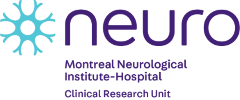The Neuro: A source of hope for brain tumour patients

Leading physicians and access to clinical trials are changing the lives of Quebecers suffering from glioblastoma
Sophie Lorenzo
October 29, 2024
In June 2021, Guylaine Mayrand began experiencing worrying episodes of confusion and convulsions. A manager in the banking sector, this mother of four from St-Lin-Laurentides saw her life turned upside down in just a few weeks. After she was sent for medical imaging, she received a staggering diagnosis: at 49 years old, she had a brain tumour, stage 4 glioblastoma.
Every day, 27 people in Canada are diagnosed with a brain tumour, a third of which are malignant. Glioblastomas are among the most aggressive brain tumours, with a very high rate of recurrence. According to the Brain Tumour Foundation of Canada, without treatment, affected individuals face a survival rate of 12 to 18 months.
The prognosis during her first neurosurgery consultation was far from encouraging. Mayrand was told some of her tumours were inoperable, and that she could remain paralyzed if they were touched. The operation she underwent left several in place.
Unfortunately, after receiving standard of care radiation and chemotherapy, her cancer progressed. Her oncologist sought to offer her hope: he referred her for a clinical trial on glioblastoma at The Neuro (Montreal Neurological Institute-hospital).
Taking the leap
Mayrand’s partner, Ghyslain Perreault, explains that the couple made the choice to move ahead despite their reluctance to start on an experimental treatment. “We were out of options. You have to take hope where you can find it,” he explains.
The Brain Tumour Foundation of Canada believes that to improve the quality of life of people with neurological cancers, they must have access to cutting-edge specialized care, but also to clinical trials. This is in part why The Neuro’s Clinical Research Unit strives to offer innovative trials for this aggressive form of cancer and are often the only ones in the province to conduct them. Dr. Owen evaluated Mayrand to participate in an innovative multimodal study for glioblastoma.
The surgery that changed everything
During the assessment, the tumours on the MRI were too large to allow the team to move forward. Dr. Owen requested a consultation with Dr. Kevin Petrecca, a world-renowned neurosurgeon specializing in glioblastoma, and head of the Department of Neurosurgery at The Neuro.
Contrary to the previous diagnosis, Dr. Petrecca saw no issue with reoperating Mayrand to resect the remaining tumours. “Dr. Petrecca was not saying the same thing as the other surgeon. How were we supposed to sort out what to do? We’re not neurosurgeons. » It was a difficult choice, but Dr. Petrecca’s expertise tipped the decision in favour of a second operation.
The benefits of a leading centre
Switching hospitals to go to The Neuro was a turning point for Mayrand. “Her recovery has been miraculous. Very few people with stage 4 glioblastoma are still around after more than three years,” confides her partner.
“Of all the doctors we saw, Dr. Petrecca is the only one where everything he told us happened to the letter; we had no surprises. And he is still very positive – he said what he sees is very promising. »
Even with world-class care, a diagnosis of brain cancer remains very difficult for the affected individual and their loved ones. Providing high-level care is essential, but The Neuro also strives to offer humane and compassionate care, including in clinical trials. And Mayrand says she wouldn’t hesitate to take part in another trial.



